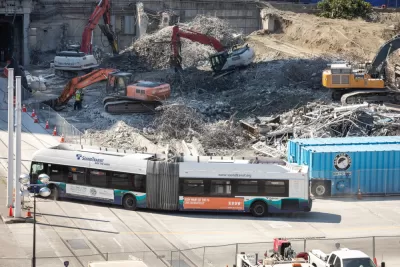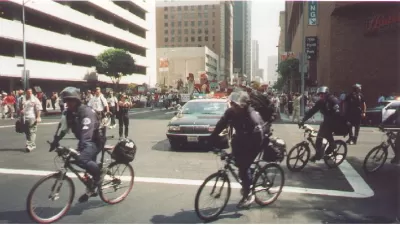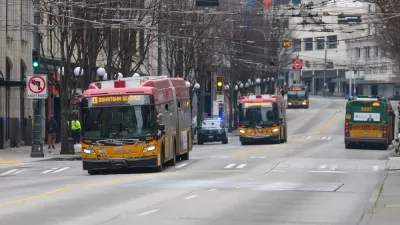The Seattle Times Editorial Board argues that automated enforcement would remove scofflaws from blocking bus commuters.

For efficiency and fairness, Seattle should experiment with automated enforcement of its bus lanes, the Seattle Times Editorial Board argues. "Given that buses carrying 90 people are routinely delayed or stopped by a single-occupant car, it’s a good idea that should be tried," the Times argues. The Seattle Department of Transportation has found that certain key points on bus routes are blocked more than a hundred times each day.
"Seattle Police could issue tickets every day, but the police have more important work and the act of stopping drivers to ticket them would further jam the bus lanes," they argue. Further, police stops can be problematic for other reasons, while the piece does not discuss it, automation could curb racial profiling and protect police and drivers from potentially violent interactions that sometimes happen during traffic stops.
Finally, the Seattle Times argues the tactic has been used successfully in other cities like London and San Francisco. "That city [San Francisco] has seen a 55 percent reduction in violations since 2014 and a 16 percent drop in collisions," they report.
FULL STORY: Cameras to nab bus-lane cheaters are a good idea

Maui's Vacation Rental Debate Turns Ugly
Verbal attacks, misinformation campaigns and fistfights plague a high-stakes debate to convert thousands of vacation rentals into long-term housing.

Planetizen Federal Action Tracker
A weekly monitor of how Trump’s orders and actions are impacting planners and planning in America.

In Urban Planning, AI Prompting Could be the New Design Thinking
Creativity has long been key to great urban design. What if we see AI as our new creative partner?

King County Supportive Housing Program Offers Hope for Unhoused Residents
The county is taking a ‘Housing First’ approach that prioritizes getting people into housing, then offering wraparound supportive services.

Researchers Use AI to Get Clearer Picture of US Housing
Analysts are using artificial intelligence to supercharge their research by allowing them to comb through data faster. Though these AI tools can be error prone, they save time and housing researchers are optimistic about the future.

Making Shared Micromobility More Inclusive
Cities and shared mobility system operators can do more to include people with disabilities in planning and operations, per a new report.
Urban Design for Planners 1: Software Tools
This six-course series explores essential urban design concepts using open source software and equips planners with the tools they need to participate fully in the urban design process.
Planning for Universal Design
Learn the tools for implementing Universal Design in planning regulations.
planning NEXT
Appalachian Highlands Housing Partners
Mpact (founded as Rail~Volution)
City of Camden Redevelopment Agency
City of Astoria
City of Portland
City of Laramie





























